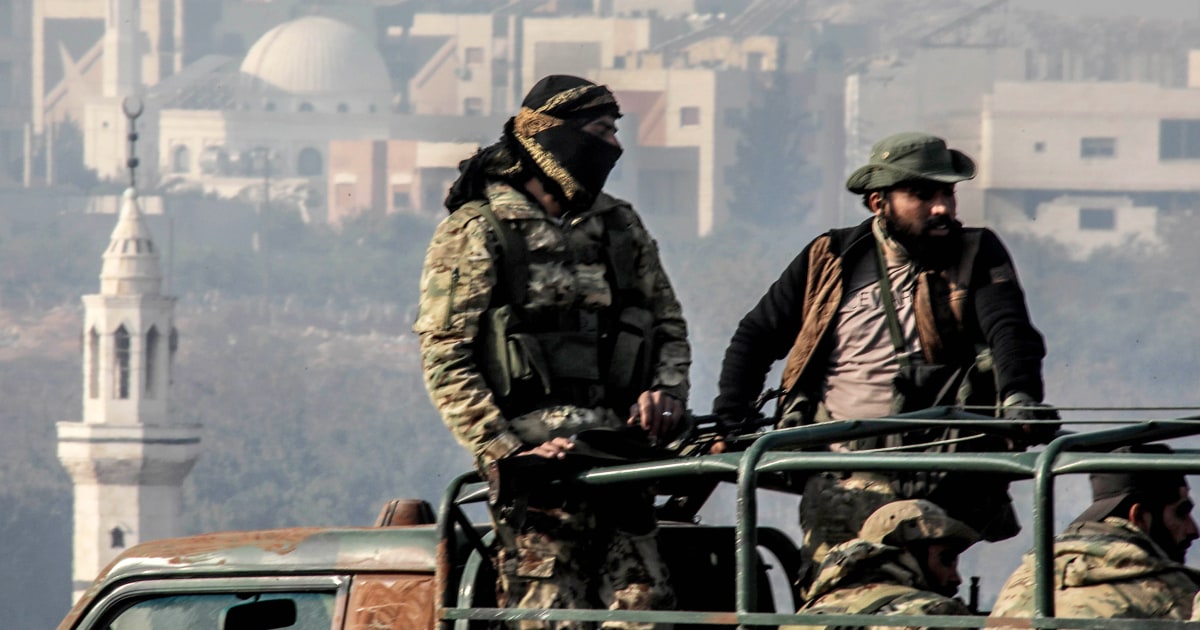Rebel fighters claimed they captured the Syrian capital of Damascus early Sunday as government forces loyal to the country’s president, Bashar al-Assad, were routed in a matter of days.
The rebels’ claim would open a new chapter in the 13-year-long civil war that has ravaged the ancient land.
“We declare the city of Damascus free from the tyrant Bashar al-Assad,” Hassan Abdul-Ghani, senior commander of the militant group Hayat Tahrir al-Sham, known as HTS, said in a post on WhatsApp. “To the displaced people around the world, Free Syria awaits you.”
NBC News has not independently confirmed the rebel’s claim.
Assad’s location was not immediately known. Multiple media reports indicate he has left Damascus, and Abdul-Ghani said Assad had fled. NBC News has not confirmed his departure or whereabouts.
Amid reports that Assad left the capital, Syria’s prime minister, Ghazi al-Jalali, said he is in his home and does not intend to leave “except in a peaceful manner that ensures the continued functioning of public institutions and state facilities, promoting security and reassurance for our fellow citizens.”
He said the government is ready to cooperate with “any leadership chosen by the Syrian people.”
HTS General Command said it also freed the people being held in Sednaya Prison. The Syrian government has detained thousands at the military prison on the outskirts of Damascus, according to Reuters.
“We announce to the Syrian people the news of the liberation of our captives and the breaking of their chains, proclaiming the end of the era of oppression in Sednaya Prison.”
Syrian state radio, Sham FM, reported that Damascus International Airport had been evacuated, all employees removed and all flights suspended. It was not clear Sunday who was in charge of the state outlet.
President Joe Biden was monitoring the events in Syria and “staying in constant touch with regional partners,” White House National Security Council spokesman Sean Savett said in a statement.
In a post on his Truth Social platform Saturday morning, President-elect Donald Trump said in all capital letters that the United States should “have nothing to do with” the situation in Syria. “This is not our fight. Let it play out.”
Militant group offensive
Damascus fell not long after rebels on Friday besieged the Syrian city of Homs with a rapid assault on government forces that left three of the country’s five largest cities in their hands and nothing to stop them from marching on the Syrian capital. HTS rebels claimed Saturday ET that they had captured the city, a day after also claiming to have seized the city of Daraa.
The U.S., which has about 900 American troops in northern Syria, has been closely monitoring developments in the country.
In less than two weeks, the HTS rebels were also able to capture the city of Aleppo in the north, as well as the central city of Hama, where government forces were forced out Thursday.
The HTS attack on Aleppo was the first opposition assault on the city since 2016, when a brutal air campaign by Russian warplanes helped Assad retake control of Aleppo.
The sudden takeover of the capital by HTS militants was seen as a blow to the outside forces that have enabled Assad to cling to power for 24 years — Russia, Iran and Iranian-backed Hezbollah.
The rapid advance by HTS comes as the Mideast is awash in fresh fighting, with U.S.-backed Israel trying to root out Hamas in Gaza and maintain a fragile ceasefire with Hezbollah in Lebanon. Both Hamas and Hezbollah are Iranian-allied groups.
Meanwhile, pro-Assad soldiers were battling Kurdish forces that seized government positions in eastern Syria near the cities of Raqqa and Deir Ez-Zour, the Syrian Observatory for Human Rights said Friday.
HTS origins
HTS grew out of the former Al Qaeda affiliate Jabhat al-Nusra and is designated as a terrorist organization by the United States and the United Nations.
It’s one of several competing forces in Syria fighting to bring down the Assad regime that, since the beginning of the country’s civil war almost 14 years ago, has killed hundreds of thousands of Syrians.
A 2020 ceasefire left Assad in control of 70% of Syria, but some 6.8 million Syrians have fled the country.
Many have gone to Europe, where the sudden influx of Syrian refugees has fueled a resurgence of anti-immigrant far-right movements from Portugal to Poland.
The recent battlefield successes of HTS are the culmination of four years of trying to turn the rebel forces into a force capable of challenging Assad’s army and equipping them with drones and other high-tech weapons of war, experts have said.
“The expansion of units … along with large-scale indigenous rocket and missile production — has created a force that Assad’s regime has seriously struggled to defend against, let alone outmaneuver,” said Charles Lister, director of the Syria program at the Middle East Institute, a Washington-based think tank, in a post on X.

